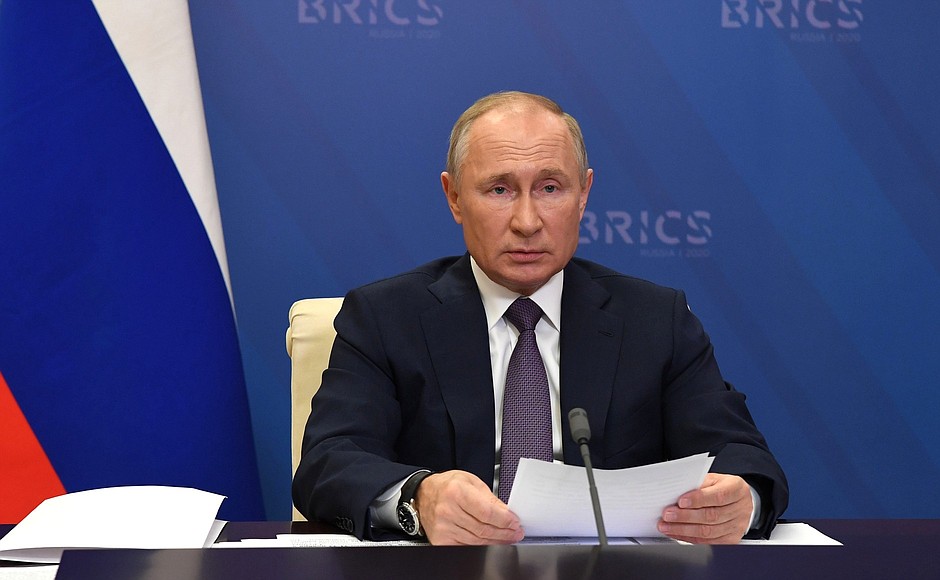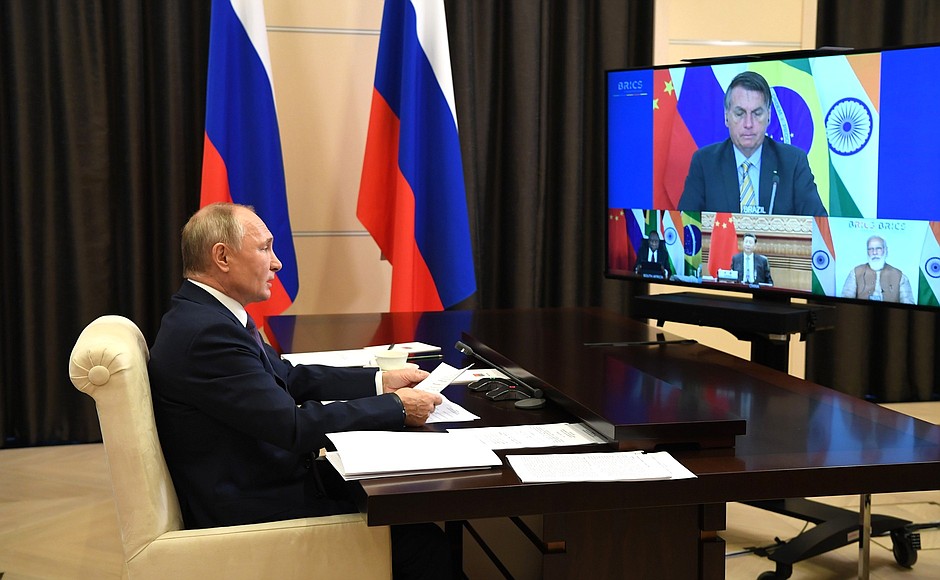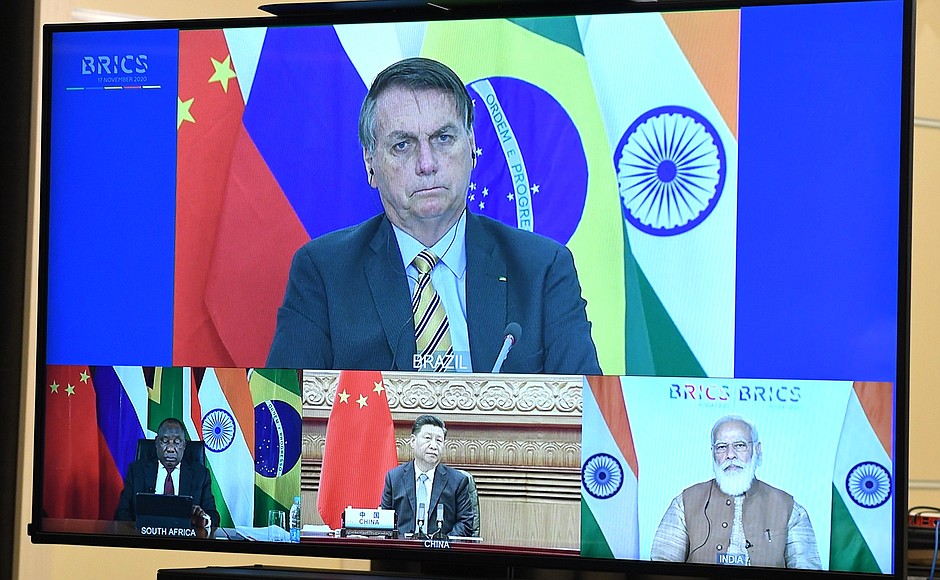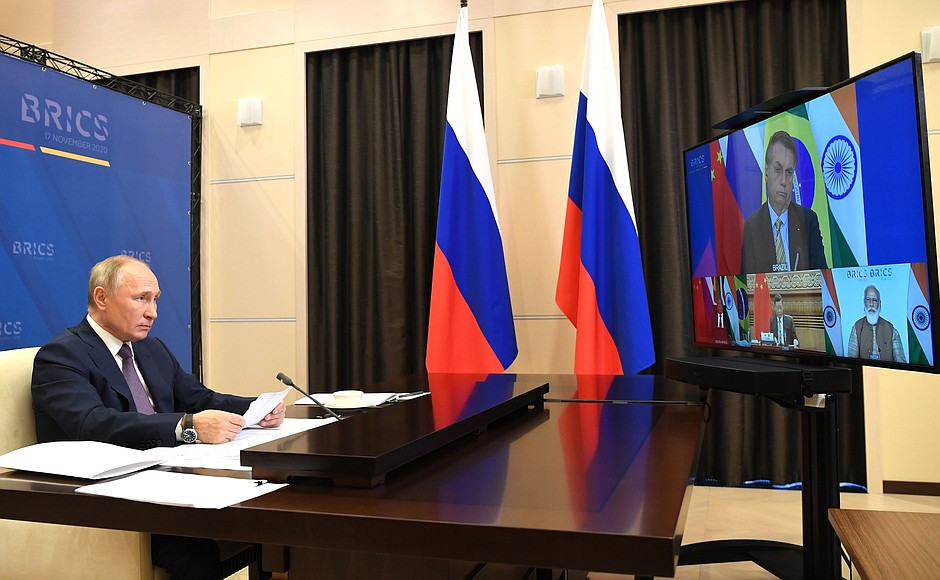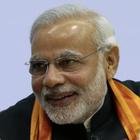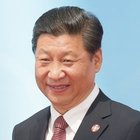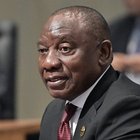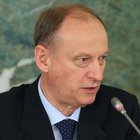President of Brazil Jair Bolsonaro, President of Russia Vladimir Putin, Prime Minister of India Narendra Modi, President of China Xi Jinping and President of South Africa Cyril Ramaphosa exchanged views on the state and prospects of their five-sided cooperation, summed up the results of Russia’s Chairmanship of BRICS in 2020, discussed the most relevant issues on the international agenda, and compared notes in regard to the upcoming G20 summit to be held on November 21–22.
During the meeting, the leaders of the BRICS states heard reports from speakers who have been overseeing the work on each track of the association's activity. Secretary of the Russian Security Council Nikolai Patrushev spoke about cooperation in the coronavirus pandemic response, in combating terrorism and cybercrime. President of the New Development Bank Marcos Troyjo cited the financial institution's performance data and plans for next year. President of the Russian Chamber of Commerce and Industry Sergei Katyrin spoke about the Business Council events, while Chairman of VEB.RF Igor Shuvalov covered the BRICS Interbank Cooperation Mechanism. The report by Chair of the Board of Directors of Global Rus Trade Anna Nesterova addressed the establishment of the BRICS Women's Business Alliance.
As a result of the consultations, the sides adopted the Moscow Declaration, which reflects the five states’ consolidated approach to the further development of the association, as well as the Strategy for the BRICS Economic Partnership until 2025 and the BRICS Anti-Terrorism Strategy.
See also
* * *
President of Russia Vladimir Putin: Colleagues, friends, good afternoon.
I am happy to see you all and to welcome you at this summit.
Prime Minister Modi, Chairman Xi Jinping, President Ramaphosa, President Bolsonaro,
It is a pleasure to have this meeting with you today within the BRICS framework.
Before we get down to work, I would like to extend my birthday greetings to the President of the Republic of South Africa, Mr Ramaphosa, and wish him good health and every success in his endeavours in the interests of the friendly people of South Africa.
Friends,
The topic chosen for today’s meeting is quite broad and covers matters that deal with expanding the strategic partnership between the BRICS countries for the sake of global stability and security, as well as fostering innovative growth of our economies. As usual, we will also discuss current international and regional matters in view of the upcoming G20 Summit, which is to take place very soon, on November 21 and 22. We will compare notes on the key aspects of the G20 agenda.
If there are no objections, colleagues, I would like to declare the 12th BRICS Summit open.
In keeping with the established procedure, allow me to be the first speaker at this meeting as the head of the state that has the current BRICS Chairmanship.
Friends, I would like to once again sincerely welcome you all and express my satisfaction with the fact that during the Russian Chairmanship the BRICS countries have proactively expanded their cooperation with one another in all the key areas, including politics, the economy and humanitarian affairs, despite the special conditions caused by the coronavirus pandemic.
We have held 130 events, including some 25 ministerial meetings. Unfortunately, but naturally in this situation, many of them had to take place online.
Of course, our current priority is to coordinate collective BRICS measures to combat the pandemic, improve collaboration between our epidemiological services and protect the lives and health of our citizens.
By the way, the subject of medical cooperation is nothing new for BRICS. In this context, we are in a better situation, relatively speaking, than some other countries. Let me remind you that the Ufa Declaration we adopted five years ago included an agreement to work together to prevent the spread of infectious diseases, including – I would like to emphasise this – novel coronaviruses. Pursuant to that agreement, the BRICS countries created an early warning system for infectious disease outbreaks, which we could use during the COVID-19 pandemic. The BRICS countries promptly responded to the disease outbreak and took practical measures to combat the pandemic.
I would like to point out that the Russian Direct Investment Fund (RDIF) has signed agreements with our Indian and Brazilian partners on clinical tests of the Sputnik V vaccine and with pharmaceutical companies in China and India on the production of this vaccine not only for our own use, but also for third countries.
I believe that this is very important. There are Russian vaccines, and they are effective and safe. The next task is to launch their large-scale production. This is not a problem, but it is a matter facing us now. Of course, it is very important to join forces for the large-scale manufacturing of this product for the general public.
Incidentally, we have registered a second coronavirus vaccine in Russia, EpiVacCorona, and the third one is in the works. As I have already mentioned, we are ready to cooperate with our BRICS partners in their manufacturing and use.
We also believe it important to accelerate the establishment of the BRICS Vaccine Research and Development Centre, as we agreed at the Johannesburg summit two years ago at the initiative of our South African friends.
This year the pandemic forced each of our countries to take emergency measures to support national industries, finance and the social sphere, to revive their economies and return them to a trajectory of sustainable growth. This is the goal of the Strategy for BRICS Economic Partnership for the period until 2025, prepared for this summit.
The New Development Bank is in great demand in the current situation. The Bank has reserved $10 billion to combat the pandemic, while its overall portfolio of investment projects now exceeds $20 billion. As many as 62 large projects are already being implemented in the BRICS countries. Incidentally, a regional branch of the bank will soon open in Moscow to implement lending programmes across the Eurasian space.
I would also like to remind you that the BRICS countries have a special insurance tool in case of a crisis in the financial markets: the BRICS Contingent Reserve Arrangement, with a $100 billion fund.
The BRICS Interbank Cooperation Mechanism is important in the parties’ cooperation on credit and investment policy; this year, they have agreed on the rules and principles of responsible financing of development institutions within its framework.
The five countries are enhancing cooperation in science, technology, and innovation. The BRICS Network University is up and running; the parties have held the BRICSMATH competition for schoolchildren this year, along with contests for young scientists and innovators and their research projects.
Intensive contacts have been underway between our academic and scientific centres. Their coverage is truly impressive – from ocean and polar research to astronomy and artificial intelligence. Experts from the five countries carry out joint energy research: reports have been prepared on the projected development of the fuel and energy sectors in the BRICS countries until 2040.
The parties continue exchanges on the cultural and humanitarian tracks. The BRICS Film Festival was held online, as we agreed earlier, colleagues. The first ever meeting of ministers of sport was held, and resulted in a Memorandum of cooperation in physical culture and sport. The dialogue between the authorities responsible for tourism in our countries has been launched.
Colleagues, we are still facing a challenging global and regional security environment. International terrorism and drug trafficking continue to pose serious threats, and cybercrime has greatly expanded its reach.
We are witnessing dangerous destabilising trends in the Middle East and North Africa. The armed conflicts in Libya and Yemen are continuing. There is still a lot to be done to bring about a political settlement in Syria, and the risks of escalation persist in Iraq, Lebanon, Afghanistan, and in the Persian Gulf.
Furthermore, as you know, the Nagorno-Karabakh conflict entered an acute phase in September. Russia went to great lengths to help stop the hostilities between our two friendly states and incite them to come to a compromise. Our mediation efforts paved the way to the November 9 agreement on a complete ceasefire and the deployment of a Russian peacekeeping force in Nagorno-Karabakh. All these provisions are set forth in the trilateral statement signed by the presidents of Russia and Azerbaijan, and the Prime Minister of Armenia.
Importantly, the parties have been complying with these agreements. Hostilities have stopped, and the situation is getting back to normal. This lays the groundwork for a lasting and comprehensive settlement that would be fair and would serve the interests of the peoples of both Armenia and Azerbaijan.
It is highly satisfying that the BRICS countries have been closely coordinating their efforts on current international and regional matters. A policy document, the BRICS Counter-Terrorism Strategy, has been drafted for this summit. The BRICS countries are expanding their cooperation on combating drug trafficking and corruption, as well as on international information security.
The BRICS High Representatives on National Security, heads of foreign ministries and our respective missions to the UN maintain regular contacts.
In the year of the 75th anniversary of Victory over Nazism in World War II, the BRICS countries have unanimously condemned the glorification of the Nazis and their henchmen and the attempts to revise the outcome of the war and to revive the ideology of aggression and intolerance.
Our countries consistently advocate constructive relations with other states, integration entities and international organisations, including in the proven BRICS Plus and BRICS Outreach formats. In our common opinion, this interaction should continue to build on the principles of respect for the UN Charter and the fundamental rules of international law such as sovereign equality of states, non-interference in internal affairs and peaceful settlement of disputes.
Colleagues, in connection with the G20 summit in Saudi Arabia on November 21–22, I would like to note that the BRICS countries’ approaches on most of the G20 agenda items are close or overlap. This concerns reforming key global institutions, such as the International Monetary Fund, the World Trade Organisation and the World Health Organisation.
With the BRICS countries’ direct contribution, a comprehensive package of G20 measures to overcome the impact of the pandemic has been put together. The main focus is on restoring global value chains and the openness of international trade. Russia’s initiative on the so-called green corridors free from wars and sanctions, primarily with regard to humanitarian supplies of food and medicine, is envisioned along the same lines.
Colleagues, in closing I would like to stress once again: Russia will always give priority attention to expanding cooperation between the BRICS states and strengthening our association’s positions in the international arena.
I would like to thank you for your friendly support and well-coordinated and effective interaction this year.
Thank you.
<…>
Vladimir Putin: Colleagues, this is what I would like to say in conclusion. We have all had special work schedules during this period, due to the current situation throughout this year. The old problems have not gone away though. They were difficult enough as it is, and they have also created additional challenges when it comes to dealing with the problems that we already had from many years ago, for entire decades. But the pooling of our efforts and our joint work to strengthen our alliance are aimed exactly at solving our problems in the most effective way possible.
I would like to thank you for your assessment of our efforts to strengthen interaction within the framework of BRICS. At the same time, I would like to point out that without your support, without the support of Prime Minister Modi, President Xi Jinping, President Ramaphosa and President Bolsonaro, the Russian Government would not have been able to do what we managed to achieve amid the battle against the coronavirus infection. Overall, I believe that together we have done this.
We expect to approve the Moscow Declaration prepared for this summit, which includes our common views on global developments and on the results of Russia’s chairmanship, and outlines the long-term guidelines for our cooperation within the framework of our organisation. In addition to this, we should approve two other documents, the BRICS Counter-Terrorism Strategy and a revised Strategy for BRICS Economic Partnership for the period up until 2025.
Unless there are any objections, colleagues, I suggest that we consider these documents adopted. This is my question for you: are there any objections? No?
Thank you very much.
I would like to add that a large package of documents on specific areas of BRICS interaction have been approved at the interagency level. In this connection, I would like to thank the concerned ministries of our countries for ensuring their coordination.
This coming January, our Indian friends will be taking over the BRICS chairmanship. I am confident that our Indian colleagues will ensure continuity in the work of our organisation and will add new interesting projects and ideas to cooperation between our five countries, including, of course, with due regard for the proposals on current matters voiced during our meeting today.
I would like to wish every success to Mr Modi and to express the hope that our next summit will be held in person, at long last. For our part, we are ready to provide all-round assistance to our Indian partners.
In conclusion, I would like to thank all our colleagues once again for the substantial discussion we had today and for our collective efforts.
Has anyone got anything to add in conclusion? No?
In that case, I would like to once again thank all of you for our joint work throughout the year and today.
Until our next meeting. Thank you.
